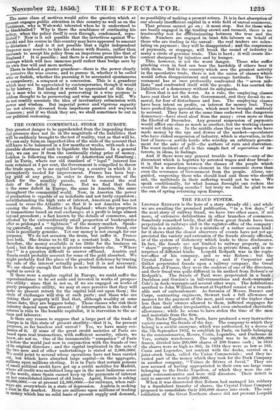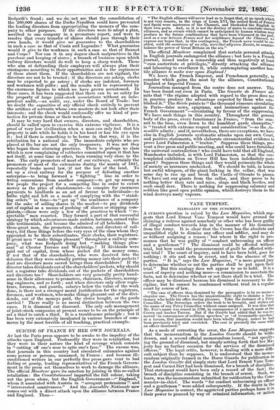THE FRAUD SYSTEM.
LEOPOLD REDPAPH is the hero of a story already old ; and while we are awaiting the promised publication, "in a few days," of the next story of railway fraud, we have two other cases, if not more, of extensive defalcations in other branches of commerce. Somebody remarked lately, that all these great frauds have been perpetrated in railways and in the register-office of the company but this is a mistake. It is a mistake of a rather serious kind - for it shows that the closest observers of events have not yet ap-' predated the variety and extension of the frauds already effected, or of the system of dishonesty which leads to these disclosures. In fact, the frauds are not limited to railway property, or to " share " property ; they happen also in private firms, and in en-• terprises of different kinds. Leopold Recipath was in the regis- ter-office of his company, and so was Robson ; but the Crystal Palace is not a railway ; and if Carpentier and Grelet perpetrated frauds upon a railway company, the Great- Northern of France, they were the cashiers of one of the directors, and their fraud, was quite different in its method from B,obson's. or Redpath's. The frauds of Paul were perpetrated in a bank ; Davidson and Gordon's in bill-transactions and dock-warrants ; Cole's in dock-warrants and several other ways. The defalcations ascribed to John William Stewart at Deptford consist of a remark- able sort of embezzlement. As foreman of Messrs. Bunnet and Corpe, contracting engineers, Stewart took a full allowance of moneys for the payment of the men, paid some of the higher class less than their owners allowed to them, inflicted stoppages for short time and other irregularities, and even-embezzled charitable allowances ; while he seems to have stolen the time of the men and materials from the firm.
The Docks Napoleon, in Paris, have produced a very instructive variety among the frauds of the day. The company to which they belong is a societe anonyme, which was authorized, by a decree of the.ith September 1852, to establish in Paris, on lande belonging to-the concessionaries, Messrs. Cusin, Legendre, and Duchesne de Vere, certain warehouses. The capital was to be 50,000,000 francs, divided into 200,000 shares of 250 francs each ; in 1863 the shares were as high as 305, in 1854 they were as low as 186. Cusin and Legendre, not content with the docks, carried on a joint-stock bank, called the Union Commerciale ; and they in- vested part of the money which they took for the Dock Company in another company, " Usines de b:evres at Javal." They are now accused of having appropriated to their own use large sums belonging to the Docks Napoleon, of which they were the ori- ginal concesssionaries and were still directors. Their deficit is said to amount to nearly 260,0001. When it was discovered that Robson had managed his robbery by a fraudulent transfer of shares, the Crystal Palace Company proposed to consolidate their 230,000 shares into stock. The con- solidation of the Great Northern shares did not prevent Leopold Redpath's fraud ; and we/do.rnot see that the consolidation of the 200,000 shares of the Ddcks Napoleon could have prevented the leading directors from appropriating the moneys of the com- pany to other purposes. If the directors were to adopt a plan, ascribed to one company in a premature report, and were to resolve that every transfer of shares should pass through their own hands, it would give no' guarantee to the shareholders in such a case as that of Cusin and Legendre ? What guarantee would it give to the workmen in such a case as that of Bunnet and Corpe ? Nor can it in any degree check malpractices in the purchase and keeping of stores ; a branch of business upon which railway directors would do well to keep a sharp watch. Those who aim at defrauding their employers will always plan their stratagems according to their opportunities and to the supineness of those about them. If the shareholders are not vigilant, the directors are not to be trusted ; if the directors are asleep, clerks may be expected to go astray ; if clerks are indolent, foremen and workmen will pilfer ; and the results will be represented by the enormous figures to which we have grown accustomed. In these Cases, it has been suggested that there can be no safety for the property of large joint-stock associations without an nide-. pendentpealit,—an audit, say, under the Board of Trade : but we doubt the capacities of any official check entirely to prevent the artifices of servants whose own masters do not look after their interests ; and the check would confessedly offer no kind of pro- tection for private firms or their workmen.
It may be very hard that owners, directors, and shareholders, should be called upon to exercise this extreme vigilance. It is a proof of very low civilization when a man can only feel that his property is safe while he holds it in his hand or has his eye upon
; but if there is something to be borne in that way, it is the retribution for a national sin. The immediate culprits who are placed at the bar are not the only trespassers. It was not they who began these alarming practices. There is perhaps no class which is now complaining of robberies committed upon it that has not itself, at some time or other, been running very close to the law. The early promoters of most of our railways, certainly the promoters of most of the extensions during the mania of 1847, repeatedly broke moral law, tif not the law of the land. To set up a rival railway for the purpose of defeating another enterprise—to bring forward a fighting " line in order to wring . concessions from another company—to get up among a few people the project for a competing line in order to extort money as the price of abandonment—to conspire for enormous payments to landlords as an act of favour to individuals—to bribe right and left as a mode of complying with the " stand- ing orders " in time--to "get up " the semblance of a company for the sake of selling shares in the market—to pay dividends out of capital as a means of pushing off shares or stopping com- plaints,—these were only a few of the practices to which " re- speetable " men resorted. They formed a part of that successful strategy by which adventurers made sudden fortunes, earned valu- able testiinonials, and became the fulinired of all beholders. But those great men, the promoters, chairmen, and directors of rail- ways, did these things before the very eyes of the class whom they appointed to be their subordinates, their clerks, their registrars. If great men " make things pleasant " throughout a railway com- pany, , what was Redpath doing but making things plea- sant ' at Chester Terrace and Weybridge ? If dividends were paid out of capital, from whose pocket did the money come, if not that of the shareholders, who were deceived into the delusion that they were actually putting money into their pockets ? And are directors more sacred beings than shareholders ? If the director takes dividends out of the shareholders' pockets, why should not a registrar take dividends out of the pockets of shareholders and directors too ? Shareholders are very generally pretty hand- some in their allowance to promoters, chairmen, directors, manag- ing engineers, and so forth ; and when directors only allow regis- trars, foremen, and guards, salaries below the value of the work done, is there not a stronger moral justification for the registrars, foremen, and workmen, who make things pleasant out of the divi- dends, out of the moneys paid, the stores bought, or the goods carried ? There really is no moral distinction between the two cases. It is diamond cut diamond.- The only safe management of joint-stock companies at present seems to be on the principle of set a thief to catch a thief. It is a troublesome principle ; 13ut it has been very extensively inculcated in various branches of com- merce by the most forcible of all teaching, practical example.



























 Previous page
Previous page